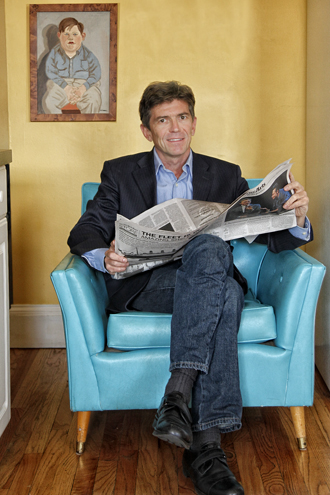Encore: Prof. Stephen McCauley has second novel adapted into French film
McCauley took some time to answer questions from BrandeisNOW on his writing process, alter egos and why the French like him so much.
 Photo/Mike Lovett
Photo/Mike LovettStephen McCauley
He doesn't write in their language, but there's something about Stephen McCauley's work that speaks to the people of France.
McCauley, professor of the practice of English and associate director of the Creative Writing Program at Brandeis, had his book "The Easy Way Out" adapted into a French film that premiered in March. It's the second time a book by the accomplished novelist has been turned into a French film; "True Enough" was adapted for the screen in French in 2007.
McCauley has written six books under his own name, including his debut "The Object of My Affection," which was adapted for the screen in 1998. He's also been published twice under the pseudonym Rain Mitchell.
He took some time to answer questions from BrandeisNOW on his writing process, alter egos and why the French like him so much.
This is your second novel made into a French movie. What is it about your style that's appealing to French culture?
It's easy to tell why people don't like your work (they usually let you know pretty directly) and more complicated to know why they do. My books have been reasonably successful in France over the years. I'd like to think it's because the French have great taste and a highly evolved appreciation for comedies of manners and social satire, but I've always had a secret suspicion that my French translator is a better, wittier writer than I am and improves my prose and plotting as she goes along. At one point I suggested we reverse the process--she write the novel to begin with and I'd translate it into English. So far, it hasn't happened.
"The Easy Way Out" was originally released over 20 years ago. How did it end up being turned into a movie now?
This is the third novel of mine that has been adapted for film. One here and two in France. In each case, a producer was drawn to a specific character, usually the central female character. "The Easy Way Out" was optioned for both film and television by a few different American producers over the last twenty years. As is the case with the overwhelming majority of such transactions, nothing ever came of it. About ten years ago, I met a French screenwriter and director who said he wanted to make a movie out of the book and to let him know when the rights became available again. Getting it made was relatively easy, but getting it released was more complicated due to an allegedly corrupt producer. It took several court cases to finally get it in theaters. The surprise success of the film was a very happy ending for everyone except the producer who now has to pay back investors, the very thing it would appear he was trying to avoid.
Has your writing process changed over the years, or do you have a routine you pretty much stick to?
My writing process is the same as it's always been, only worse. I have to leave my house to write and sometimes it takes me hours to get out the door. I recently published two novels under a pseudonym, and I'm happy to say that my alter ego has remarkably good discipline and a stellar work ethic. Those qualities are in me somewhere, but they're easier to access when I'm wearing a mask.
Some writers like to keep their pseudonyms a secret — Stephen King said his died when it was discovered — now that yours is out there, does or will Rain Mitchell still write?
Rain Mitchell is not dead but sleeping peacefully. I am in discussion with my French publisher to write the third and final volume of Rain's trilogy. At that point, death seems likely.
You mentioned you have to leave the house to write. Once you coax yourself out, are there any particular places you like to go?
I like to write in libraries. I often go to the Cambridge Public Library because it's all glass and therefore full of light. Other times I like to work in a corner of the basement of the Brandeis library because it's windowless. When I don't have long blocks of time, I go to coffee shops. I gave up drinking coffee on a regular basis about about five years ago, so one shot of espresso really gets me rolling.
How does being an active novelist inform your teaching style/methods?
Writing fiction is a humbling experience. It is for me, anyway. You have to work through indirection and subtext, and that can take a long time and extensive revision. When you write in a comic vein, it can be even more complicated. I try my best to remember that when I'm teaching and to help my students understand the process of uncovering the real story in their early drafts. Of course, it's a two-way street. I find myself reading my own work and trying to imagine the advice I'd give if it was a student's manuscript.
Categories: General





